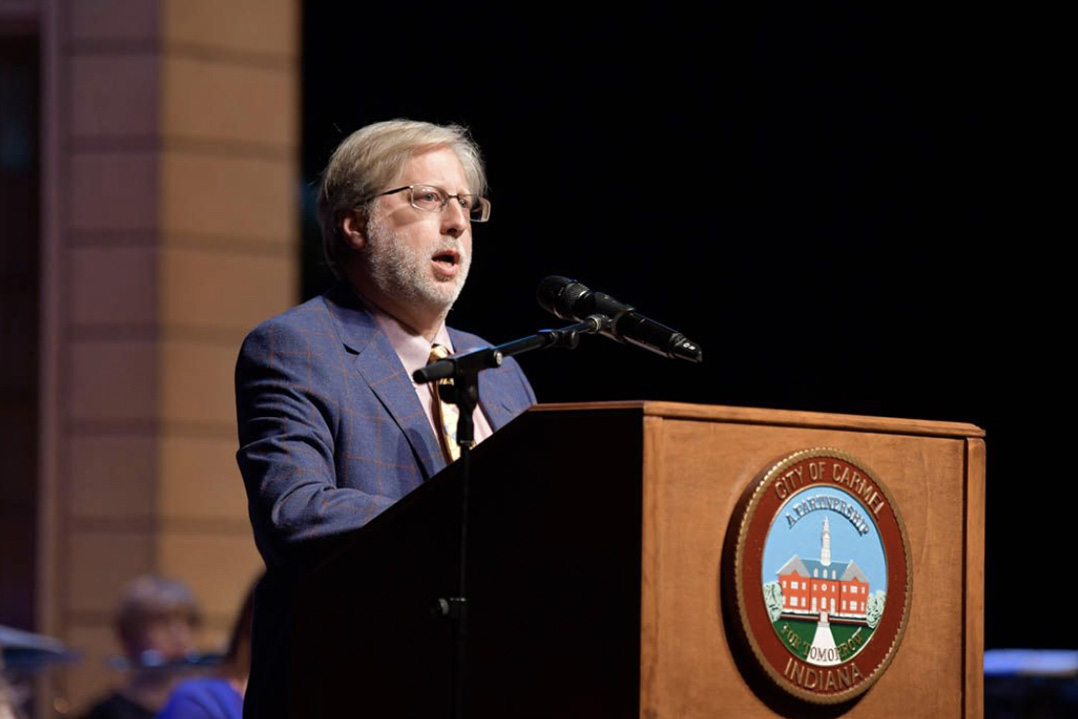For Michael Wallack, the sound has been unmistakable. The anti-Semitic dog whistles are getting louder.
“Several years ago, some ‘very fine people’ marched through an American city carrying torches and chanting ‘Jews will not replace us,’” Wallack said of the 2017 march in Charlottesville, Va. “They were talking about replacement theory, the idea that Jews are using immigration by people of color as a means to take over America from its dominant white population. Replacement theory became a popular talking point on certain media outlets and among certain elected officials, though they were often careful not to mention Jews. A year later, a man driven by fear and anger over replacement theory walked into a synagogue in Pittsburgh and opened fire, killing 11 Jews. A year after that, a man opened fire in a synagogue in San Diego. That murderer was also motivated by fear of replacement theory.”
Wallack, a Carmel resident who spoke April 21 at the City of Carmel Holocaust Remembrance ceremony at The Tarkington at the Center for the Performing Arts, is on the mayor’s advisory council on human relations. Wallack said the Anti-Defamation League has recorded a frightening increase in the number of anti-Semitic incidents and attacks in the last few years. Wallack said he originally intended to talk about the statistics and give more examples of the types of incidents, ranging from vandalism, such as that which occurred in 2018 at the Shaarey Tefilla synagogue in Carmel, or assault and murder, such as the recent shooting of two men leaving a synagogue in Los Angeles, to the planned assassinations of Jewish officeholders in Michigan or the call for a ‘Day of Hate’ that prompted Jewish communities across the country, including in Indianapolis, to alert local police and issue serious warnings.
Wallack said many in the audience didn’t need to hear that anti-Semitism is increasing.
“You know it,” Wallack said. “You hear it. You see it. You feel it in your bones. You may have even been the victim of it. When you hear someone talking about George Soros, you know that it’s a dog whistle that really means ‘the Jews.’ You know that words like ‘Hollywood’ or ‘the media’ or ‘elites’ or globalists’ are often code words for ‘the Jews.’ And you know that the people to whom these dog whistles are directed are the same types of people who have been slaughtering Jews for two millennia. But today, those people are no longer hiding in basements or in the darkest corners of the internet. They’re offering their hatred for the world to see, and they’re not being criticized, punished or ostracized for doing so. They’re being given platforms to spew their hatred, and there is an audience ready to listen and to act violently.”
Wallack said anti-Semitism doesn’t happen spontaneously but is learned and taught.
“These days, there is a segment of society that is hurting, feeling left behind, feeling as if society is moving in a direction that frightens them,” he said. “The easiest way to sway those people, to bring them to a particular view, is to give them an outsider to blame. This strategy has worked for millennia. Offer up a scapegoat. Troubles are not of their own making. They’re not the making of those they’ve trusted to advocate on their behalf. They’re not the making of those who benefit from their misery. Nope. All of the troubles can be targeted at the same people who have been the scapegoat for similar misery for millennia: the Jews.”
Wallack said once someone recognizes an anti-Semitic dog whistle, it is that person’s duty to say something.
“Calling it out when you hear it is the first step to being sure that it doesn’t escalate from words to action to violence,” Wallack said. “Jewish homes, businesses and houses of worship should not be places of fear. But do more than call out the anti-Semitic speaker. Call out the co-worker or Facebook ‘friend’ who sends the anti-Semitic meme just because it was funny. Call out the elected official who stands by silently. Call out the politician who is afraid of losing a vote and so won’t call out bigotry amongst his or her supporters. We may not be able to change the hearts or minds of die-hard anti-Semites, but perhaps we can begin to get people of good will to recognize the danger that their silence or acquiescence can cause. Unfortunately, too many so-called leaders have abdicated their responsibility to keep a certain segment of our communities safe. They’ve allowed certain voices to spew hatred without challenge. They use bigotry to secure votes. That is irresponsible. That is dangerous.”
Wallack said silence and acquiescence are not options.
“Otherwise, statements like ‘never again’ will become ever more hollow,” he said.
Indianapolis resident Julie Sondheim was the keynote speaker, explaining how her grandfather, Alfons Katz, survived the Holocaust, which led to the death of many of her other family members. Katz died in 2010, one day shy of his 90th birthday.



